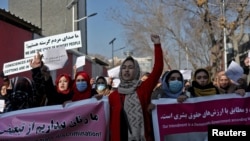Witnesses say Taliban security forces in Afghanistan fired warning shots Tuesday to disperse a group of female activists in Kabul protesting restrictions placed on women in the country.
The women marched through the streets of the Afghan capital toward the Ministry for the Promotion of Virtue and Prevention of Vice, which enforces Islamic law as interpreted by the Taliban. Protesters held banners reading, “We are tired of discrimination” along with, “We are the voice of hungry people.”
Other banners read, “We women wake up and hate discrimination,” and "Why have you closed schools?” Protesters demanded work, food and education.
One participant, Hoda Khamush, told VOA that Taliban forces resorted to firing in the air to disperse the participants who tried to enter the building, which had housed the Women's Affairs Ministry under the deposed Western-backed Afghan government
Khamush alleged the violence injured some protesters but VOA could not independently verify the claim. Taliban officials did not immediately offer any comment on the incident.
Afghan television channels aired images from the rally.
The protest comes two days after the ministry issued travel curbs on women across Afghanistan, further curtailing their rights. The new rules limit a woman’s ability to travel farther than 72 kilometers unless accompanied by a close male relative. They also require taxi drivers to offer rides only to women wearing an Islamic hijab or a headscarf and to refrain from playing music in their vehicles.
The government has allowed schoolboys to return to classes but girls across many Afghan provinces are still waiting for permission to do so and most women have been prevented from returning to work.
Last month, the Taliban’s ministry ordered Afghan channels to stop showing dramas and soap operas featuring actresses, and female news anchors to wear hijabs while on the air.
The ultraconservative group regained power in August and named an all-male interim Cabinet to govern the conflict-torn country in line with the group’s strict interpretation of Islam, despite pledging not to bring back the harsh polices of their previous regime from 1996 to 2001.
When the Taliban were last in power, girls were not allowed to attend school and women were barred from work as well as education. The then-Ministry for the Promotion of Virtue and Prevention of Vice, or the morals police, had been accused of serious human rights abuses, leading to Afghanistan’s isolation from the world.
The United States and the global community at large have not recognized the new Taliban government. They are refusing to open direct political engagement with the Islamist group until it ensures respect for human rights, especially those of women, runs the country inclusively and cuts ties with transnational terrorists.
The lack of government legitimacy has hampered the flow of humanitarian assistance to Afghanistan, where years of war, drought and poverty have left nearly 23 million people with acute food shortages and in need of urgent relief.




